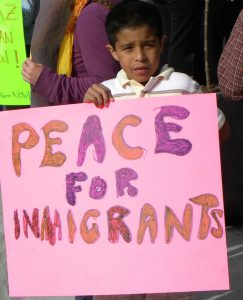By Julie M. Linton, MD, FAAP
A version of this blog first appeared as part of the NC Pediatric Society’s Guest Blogger series.
 A young child and her pregnant mother are detained for days at our country’s southern border after fleeing gang violence in the Northern Triangle; alone and pregnant, a teenage girl has traveled from Mexico to escape chronic sexual abuse and abject poverty; and an entire family, having lived for nearly two decades in a refugee camp in Tanzania after fleeing their homeland due to armed conflict, have finally been able to cross the Atlantic and enter the United States of America.
A young child and her pregnant mother are detained for days at our country’s southern border after fleeing gang violence in the Northern Triangle; alone and pregnant, a teenage girl has traveled from Mexico to escape chronic sexual abuse and abject poverty; and an entire family, having lived for nearly two decades in a refugee camp in Tanzania after fleeing their homeland due to armed conflict, have finally been able to cross the Atlantic and enter the United States of America.
I have heard the stories of so many families from so many places across our globe. Their stories are set amidst circumstances that comprise my own worst nightmares. I make every effort to avoid casting judgment on why a family chooses to make the journey across our borders. Caring for immigrant children and families is a continuing education beyond traditional medical textbooks. It is an education in history, political science, anthropology, and religion. I have heard my first words of beautiful languages like Tigrinya and Kinyarwanda. I have cried while listening to stories of trauma that threaten innocence, and generate bravery and resilience. I have seen the impact of a lifetime of lacking access to primary care – stunted growth and malnutrition. I have seen the results of exposure to egregious conditions.
As I approach the shy child hiding behind her mother in the exam room, I seek to understand her journey. Did she suffer from trauma in her country of origin, as she traveled to the United States, or when apprehended at our border? Has she felt welcomed by our community? Does she feel safe? Through the eyes of these children and families, I have seen the scars of trauma overcome by the beauty of new hope. Caring for immigrant children who have fled their homelands is humbling, exhausting, and inspiring.
For me, refugees are children seeking safe haven from fear, violence, and persecution; children who are yearning for a future within our borders. This includes diverse populations, such as refugee children who enter through formal channels, unaccompanied children, and children in family units who have been in detention at our border.
Trauma, poverty, and the lack of health care access place children at risk and are challenges bigger than one pediatrician’s practice. When we think about immigrant children, we should consider all the different ways we can utilize public policy to support their health and to put them on track for success in their new home.
We need policy that gives all children, including immigrant children, access to health care coverage within a medical home that can offer compensated interpreter services in their preferred language.
We need systems that prevent children, when they apprehended at our border as they seek safe haven, from detention in settings where their health and well-being is not a priority.
We need programs that offer expanded legal representation to children facing legal recourse after apprehension.
We need legislative support for programs that protect children and parents from deportation and allow them to apply for work authorization. These programs, such as Deferred Action for Child Arrivals (DACA) and Deferred Action for Parents of Americans and Lawful Permanent Residents (DAPA), mitigate tremendous fear among recipients and their families, help to keep families together, and offer recipients an opportunity to further contribute to the communities that they consider home.
Finally, we need legislators to welcome immigrant children with compassionate language and non-discriminatory policy as they seek safe haven in our communities. It is not enough to offer our hands in service. We can use our minds to develop public policy that represents justice as we open our hearts to the needs of children who are here for safety.
Dr. Julie M. Linton is a pediatrician in Winston-Salem, a member of the American Academy of Pediatrics (AAP) Executive Committee for the Council on Community Pediatrics, and the Chair of the AAP Immigrant Health Special Interest Group for the American Academy of Pediatrics.
